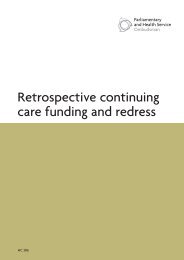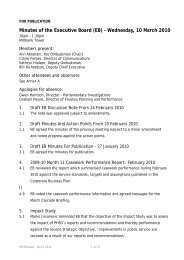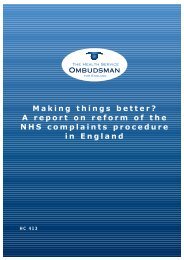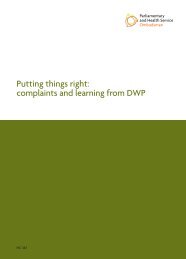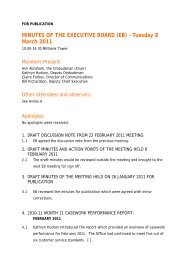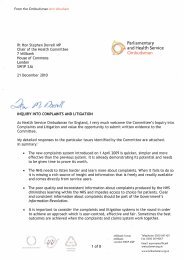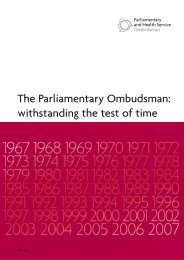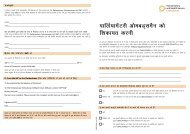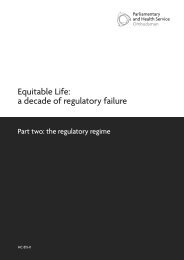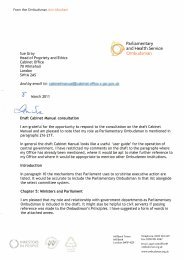Annual Report 2007-08 - the Parliamentary and Health Service ...
Annual Report 2007-08 - the Parliamentary and Health Service ...
Annual Report 2007-08 - the Parliamentary and Health Service ...
- No tags were found...
You also want an ePaper? Increase the reach of your titles
YUMPU automatically turns print PDFs into web optimized ePapers that Google loves.
Her Majesty’s Revenue & CustomsOf <strong>the</strong> 91 complaints against HMRCaccepted for investigation during<strong>2007</strong>-<strong>08</strong>, 85% were about tax credits.Similarly, 91% of <strong>the</strong> 68 complaintsaccepted against <strong>the</strong> Adjudicator’s Officewere about <strong>the</strong>ir h<strong>and</strong>ling of tax creditcomplaints.It is clear that, despite <strong>the</strong> considerableimprovements HMRC has made in itsadministration of tax credits, it still hasa long way to go to be appropriatelycustomer-focused. It is also clear thatmany tax credit recipients still do notunderst<strong>and</strong> how <strong>the</strong> tax credit systemworks, <strong>and</strong> <strong>the</strong>ir complaints can often,<strong>the</strong>refore, relate to <strong>the</strong> system workingas it is intended.Most of <strong>the</strong> tax credit cases referredto us for investigation in <strong>2007</strong>-<strong>08</strong> relatedto <strong>the</strong> recovery of overpayments. Moststemmed from <strong>the</strong> early years of <strong>the</strong>scheme (2003-06), after which, in <strong>the</strong>2006-07 tax year, HMRC changed <strong>the</strong>level of income disregarded from £2,500to £25,000. A number of factorshampered our ability to process HMRCcases during <strong>the</strong> year. The most significantthree are outlined below.• Section 18About 25% of <strong>the</strong> tax credit cases weassessed or investigated in <strong>2007</strong>-<strong>08</strong>were affected by <strong>the</strong> ‘section 18’procedural error announced inParliament in July <strong>2007</strong>. As a result ofthis error, HMRC is required to reviewapproximately 250,000 tax credit cases,which it says may take up to three yearsto complete. This has already led tosome delays in <strong>the</strong> resolution of casesbecause HMRC is unable to provideaccurate information to <strong>the</strong>Ombudsman, <strong>the</strong> Adjudicator or itsown complaints teams on an affectedcase, until <strong>the</strong> review of that case hasbeen completed.• Code of Practice 26Uncertainty over whe<strong>the</strong>r changesto <strong>the</strong> application of Code ofPractice 26 (COP 26: <strong>the</strong> guidanceHMRC use to determine whe<strong>the</strong>rto waive overpayments) would beapplied retrospectively delayedmost of our tax credit assessments<strong>and</strong> investigations for several weeksat <strong>the</strong> start of 20<strong>08</strong> until <strong>the</strong> positionwas clarified by HMRC.• Lost CD-ROMsOur ability to progress with someinvestigations was affected by <strong>the</strong> lossin November <strong>2007</strong> by HMRC of twoCD-ROMs. These contained <strong>the</strong>personal details of families receivingchild benefit. As a result of <strong>the</strong> loss,HMRC had to review <strong>the</strong> security ofall its external communication channels<strong>and</strong> was accordingly unable tocommunicate with us by post, faxor email for a number of weeks, <strong>and</strong>unable to recommence sending ustelephone recordings (relevant to manycases) for over three months.Still getting things wrongIt is clear from <strong>the</strong> complaints receivedthat attempts by HMRC to recoveroverpayments made under <strong>the</strong> tax creditsystem continue to cause distress <strong>and</strong>hardship for a significant number ofpeople. As one complainant put it:‘Tax credits are supposed to help families,not cause <strong>the</strong>m money worries’.In June 2005 <strong>the</strong> Ombudsman publishedTax Credits: Putting Things Right, herfirst special report on <strong>the</strong> issue. Thisconcluded that many of <strong>the</strong> difficultiesfamilies were facing were a result ofHMRC having developed a ‘one size fitsall’ system that was designed to requireminimum human intervention, beingmainly IT-based. The consequences ofthis systemic inflexibility are seen in <strong>the</strong>case of Mr C.18



